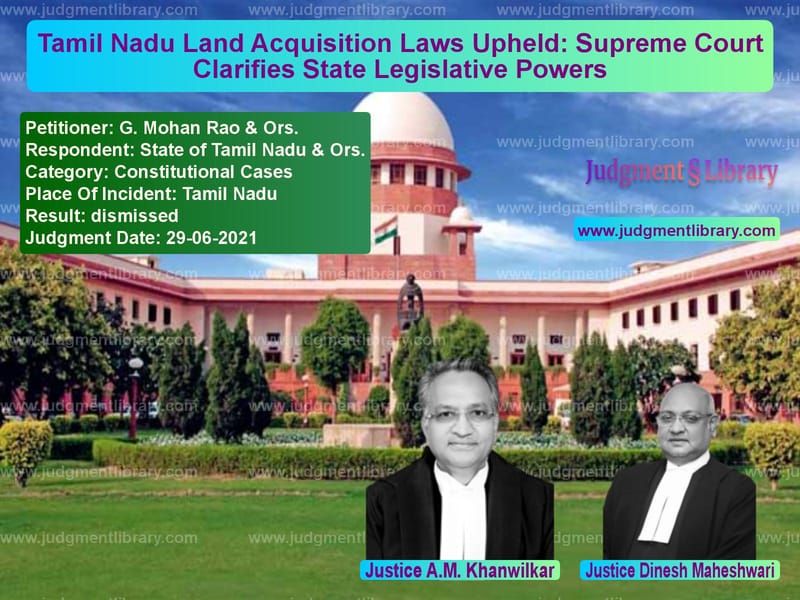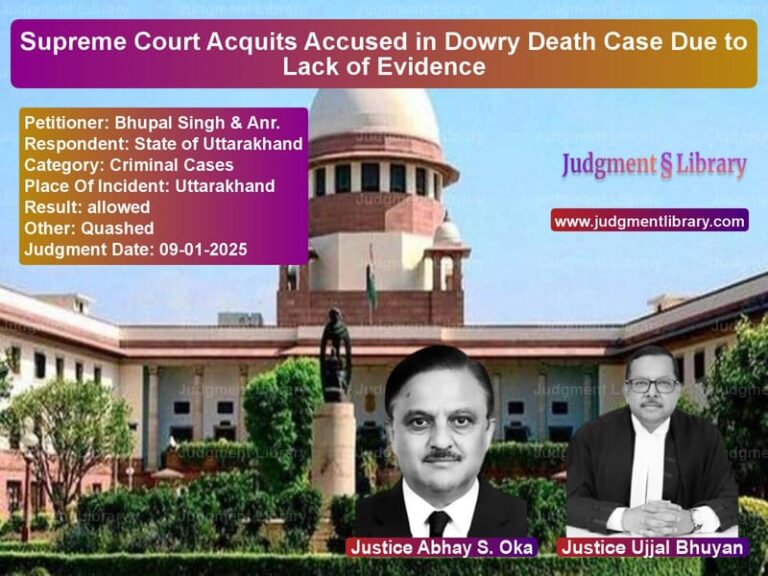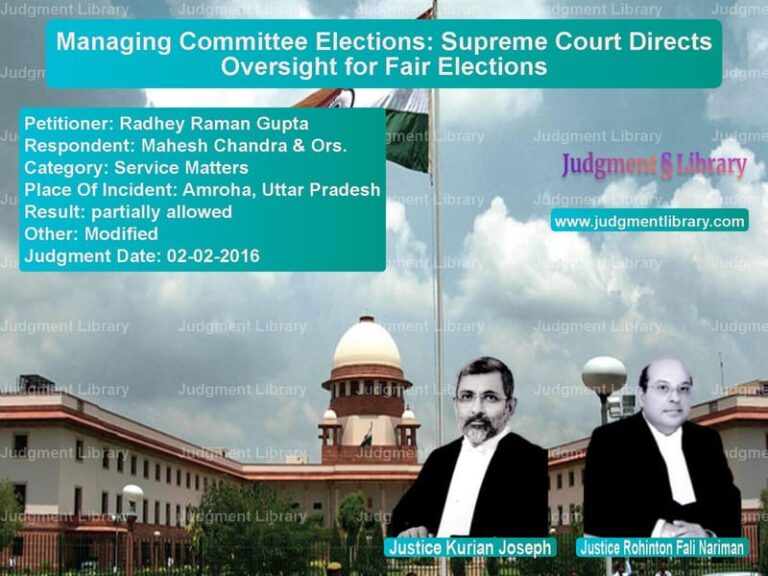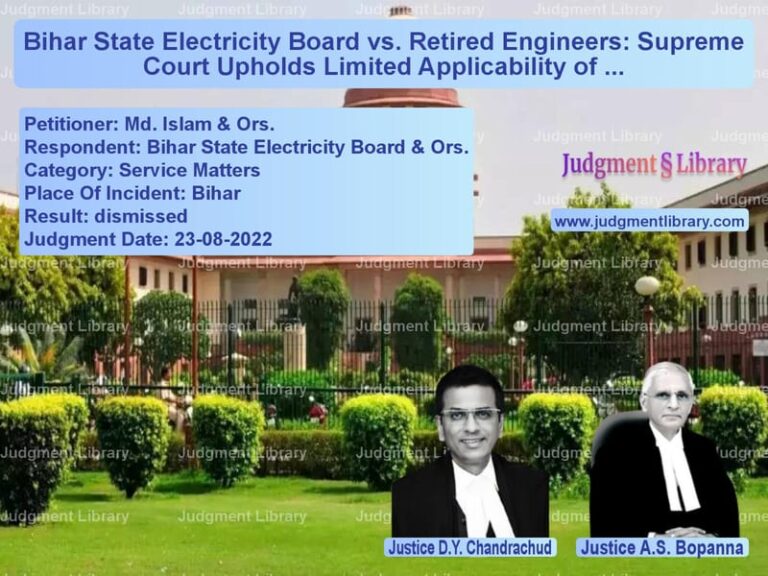Tamil Nadu Land Acquisition Laws Upheld: Supreme Court Clarifies State Legislative Powers
The Supreme Court’s verdict in G. Mohan Rao & Ors. vs. State of Tamil Nadu & Ors. has reaffirmed the power of State Legislatures to enact laws that may be repugnant to Central laws if Presidential assent is obtained under Article 254(2) of the Indian Constitution. This case revolved around the validity of the Tamil Nadu Land Acquisition Laws (Revival of Operation, Amendment and Validation) Act, 2019 (hereafter referred to as the ‘2019 Act’), which sought to restore the operation of three state-specific land acquisition laws that had been invalidated by the Madras High Court.
Background of the Case
The dispute originated from Tamil Nadu’s land acquisition laws enacted over several decades, namely:
- The Tamil Nadu Acquisition of Land for Harijan Welfare Schemes Act, 1978.
- The Tamil Nadu Acquisition of Land for Industrial Purposes Act, 1997.
- The Tamil Nadu Highways Act, 2001.
These state laws were enacted under the Concurrent List, allowing both the Centre and the States to legislate on matters related to land acquisition. However, with the introduction of the Right to Fair Compensation and Transparency in Land Acquisition, Rehabilitation, and Resettlement Act, 2013 (the 2013 Act), these Tamil Nadu laws became inconsistent with the new Central law, which provided enhanced compensation and rehabilitation measures for affected landowners.
On July 3, 2019, the Madras High Court declared these Tamil Nadu laws void due to their repugnancy with the 2013 Act. In response, the Tamil Nadu government enacted the 2019 Act, incorporating provisions of the 2013 Act related to compensation, rehabilitation, and resettlement while reviving the operation of the state laws.
Legal Issues in the Case
The key legal questions before the Supreme Court were:
- Whether a State Legislature can revive laws that have been struck down as unconstitutional.
- Whether the Tamil Nadu Land Acquisition Laws were repugnant to the 2013 Act.
- Whether the 2019 Act validly incorporated the provisions of the 2013 Act to remove inconsistencies.
- Whether Presidential assent under Article 254(2) allowed the state laws to operate despite repugnancy.
Petitioners’ Arguments
The petitioners, led by G. Mohan Rao & Others, challenged the 2019 Act on the following grounds:
- The Tamil Nadu Legislature lacked the authority to revive laws that had been declared unconstitutional by the High Court.
- The revival of these laws through the 2019 Act amounted to an impermissible legislative override of judicial pronouncements.
- The state laws discriminated against landowners in Tamil Nadu by denying them the benefits of the 2013 Act.
- The retrospective operation of the 2019 Act from September 26, 2013, sought to validate unlawful acquisitions.
- Article 254(2) does not permit the revival of laws struck down by the judiciary.
Respondents’ Arguments
The State of Tamil Nadu, defending the 2019 Act, submitted that:
- The Legislature has the power to enact a validating law to cure defects pointed out by the High Court.
- The 2019 Act incorporated compensation and rehabilitation measures from the 2013 Act, removing the basis for repugnancy.
- The Tamil Nadu government had obtained Presidential assent under Article 254(2), making the state law operative despite any inconsistency with the 2013 Act.
- The retrospective effect of the 2019 Act was necessary to ensure the validity of past acquisitions.
Supreme Court’s Observations
The bench comprising Justice A.M. Khanwilkar and Justice Dinesh Maheshwari examined the constitutional framework regarding repugnancy between State and Central laws. The Court held:
- The Tamil Nadu Legislature had the competence to enact the 2019 Act under the Concurrent List.
- The State’s power to legislate was not taken away merely because its earlier enactments had been invalidated by the High Court.
- The 2019 Act effectively removed the repugnancy by incorporating the enhanced compensation and rehabilitation provisions of the 2013 Act.
- The Presidential assent granted under Article 254(2) was valid and allowed the State law to operate even though it deviated from the Central law.
- The retrospective validation of acquisitions under the 2019 Act was not unconstitutional since the State had the legislative competence to pass such a law.
Verbatim Observations of the Supreme Court
The Court made the following critical observations:
“The power of a State Legislature to enact laws under the Concurrent List is subject to Article 254. However, Article 254(2) allows a State law to prevail over a Central law in cases where Presidential assent is obtained. This is a well-recognized principle of federalism.”
“A validating Act does not usurp judicial power. It removes the basis of the decision of the Court by curing the defect pointed out in the earlier judgment.”
“So long as the State Legislature acts within its constitutional limits and ensures compliance with constitutional principles, its lawmaking power remains intact.”
Final Judgment
The Supreme Court dismissed the petition and upheld the validity of the 2019 Act, holding that:
- The Tamil Nadu Legislature was within its rights to enact the 2019 Act and remove the repugnancy.
- The 2019 Act was a valid piece of legislation and not an unconstitutional attempt to override the High Court’s judgment.
- The incorporation of the 2013 Act’s provisions ensured that landowners in Tamil Nadu were not unfairly deprived of fair compensation.
- Article 254(2) empowered the Tamil Nadu government to enact laws that would otherwise be repugnant to the Central law.
Impact of the Judgment
The Supreme Court’s ruling has far-reaching consequences:
- It reaffirms the power of State Legislatures to enact laws under Article 254(2) with Presidential assent.
- It provides clarity on the scope of State powers in validating previously unconstitutional enactments.
- It establishes that States can enact laws to cure defects pointed out by courts, provided they comply with constitutional mandates.
- It strengthens the principle of federalism, allowing States greater flexibility in legislative matters.
Conclusion
The Supreme Court’s decision in G. Mohan Rao & Ors. vs. State of Tamil Nadu & Ors. is a landmark ruling on the issue of repugnancy between State and Central laws. By upholding the validity of the 2019 Act, the Court has provided a clear precedent on how States can legislate on matters where a Central law exists, ensuring that constitutional processes are adhered to. The ruling reinforces the importance of legislative competence, judicial review, and federalism in the Indian legal system.
The appeal was dismissed, affirming the validity of the Tamil Nadu Land Acquisition Laws.
Petitioner Name: G. Mohan Rao & Ors..Respondent Name: State of Tamil Nadu & Ors..Judgment By: Justice A.M. Khanwilkar, Justice Dinesh Maheshwari.Place Of Incident: Tamil Nadu.Judgment Date: 29-06-2021.
Don’t miss out on the full details! Download the complete judgment in PDF format below and gain valuable insights instantly!
Download Judgment: g.-mohan-rao-&-ors.-vs-state-of-tamil-nadu-supreme-court-of-india-judgment-dated-29-06-2021.pdf
Directly Download Judgment: Directly download this Judgment
See all petitions in Fundamental Rights
See all petitions in Constitution Interpretation
See all petitions in Legislative Powers
See all petitions in Public Interest Litigation
See all petitions in Separation of Powers
See all petitions in Judgment by A M Khanwilkar
See all petitions in Judgment by Dinesh Maheshwari
See all petitions in dismissed
See all petitions in supreme court of India judgments June 2021
See all petitions in 2021 judgments
See all posts in Constitutional Cases Category
See all allowed petitions in Constitutional Cases Category
See all Dismissed petitions in Constitutional Cases Category
See all partially allowed petitions in Constitutional Cases Category







